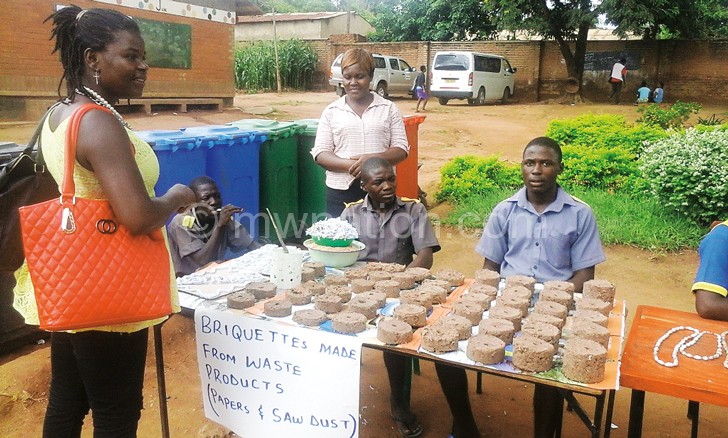Chalking economic fortunes from garbage
Gubu Village in Traditional Authority (T/A) Tsabango lies less than seven kilometres from the seat of government at Capital Hill in Lilongwe.
Yet, a visit to the area proves that, apart from food shortage, Malawi’s poverty is well manifested in, among other deprivations, poor access to water and sanitation facilities.
Residents of the area attest that, until two years ago, they never knew piped water. Other areas falling under the category include Mtandire, Chinsapo, Areas 24, 25, 38, 44, 36, 46, 56, and Chatata-Mchezei.
The National Sanitation Policy places responsibility for sanitation under water boards, which some believe breeds confusion regarding relative roles and jurisdictions of local governments and water boards.
“The Water Department in the Ministry of Agriculture, Irrigation and Water Development is the lead institution in water and sanitation policy development although it intends to withdraw from implementation to concentration on policy, regulation, monitoring and water-resource management,” notes Alma Consultancy researcher and executive director Mtafu Zeleza Manda in his 2009 study.
While the confusion continues, health experts recommend embracement of best water, sanitation and hygiene (Wash) practices to prevent diseases and promote positive attitudes towards cleanliness.
But as Gubu Village Development Committee (VDC) chairperson Mailosi John Kamphambe reveals, many households do not have necessary sanitation and hygiene facilities such as modern toilets and hand-washing bowls, among others.
Kamphambe explains: “It’s not that people were not willing. But they have been long denied facilities where they can implement best practices in water, sanitation and hygiene.”
But the VDC chairperson is hoping for a change following the intervention of a consortium of Water Aid Malawi, Circle for Integrated Community Development (Cicod), Training Support for Partners (TSP) and LWB (Lilongwe Water Board).
With financial support from the European Union (EU), the organisations have since June 2014 been implementing the integrated water, sanitation and hygiene project in Lilongwe’s low income areas.
Water Aid Malawi urban programme manager Wellington Mitole says the project aims is to contribute towards reducing poverty in Malawi by achieving sustainable water supply and sanitation for vulnerable peri-urban populations of Lilongwe.
Mitole says the project is targeting both institutions and communities such that each of the partners has specific roles based on the comparative advantages that together contribute towards achieving a successful integrated Wash delivery project.
“Apart from addressing water and sanitation problems, the project aims at economically empowering beneficiaries through formation of village savings and loan associations (Vslas).
“These associations help households to save and access loans for constructing modern pit latrines and venture into small and medium enterprises,” he narrates.
Mitole says through the project, the four organisations have also established eight water users’ associations (WUAs), mother groups and built modern pit latrines, including 10 each at Mlodza and Msambachikho schools.
He says school latrines have been designed to accommodate learners with special needs.
“The latrines have menstrual hygiene management rooms,” says Elizabeth Chitatu, head teacher at Mlodza LEA School.
The project has also facilitated completion of Wash guidelines and regulatory frameworks, including waste management, waste transfer management guidelines and private waste operators’ guidelines on liquid and solid waste.
The project is also training communities and pupils the art of converting wood, plants, plastics, textiles, and other materials except metal, glass and stone into fuel for cooking. Other products are bangles and beads.
And as Chitatu explains, the pupils have, for the past weeks, learnt the art of turning wastes and paper into fire briquettes.
Maeve Project sales and marketing manager for the stove division Kinna Offen says Malawi would save her environment if the people adopt efficient fuel saving technologies, which include biomass briquettes as an alternative energy source for household use.
Offen adds that fuel briquettes made from everyday agricultural and commercial residues such as weeds, leaves, sawdust, rice husks, carton boards and scrap paper are a unique, yet well proven and simple-to-use technology.
He emphasises that people who adopt this technology save time, energy and the environment while generating income in the process.
Mlodza WUA chairperson Maxwell Chikho attests: “We’ve employed inspectors to monitor and gather information on sanitation and hygiene at kiosks. These people would have been jobless.”





